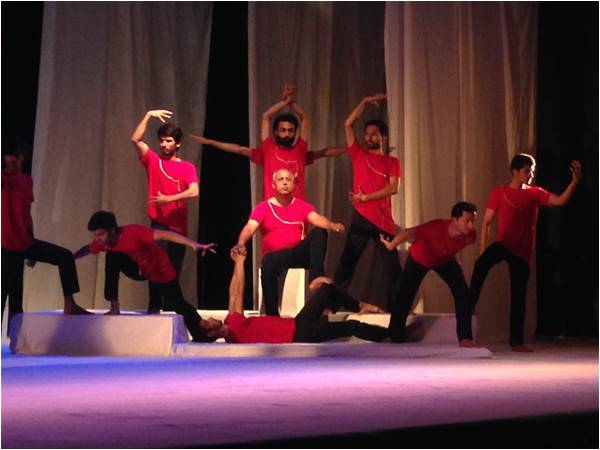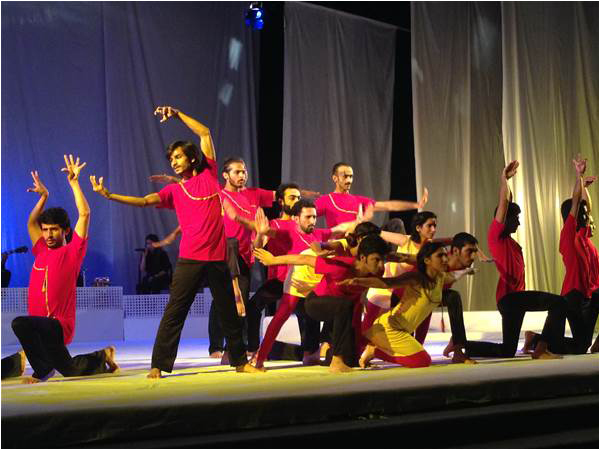
Shakuntala is a classic of Sanskrit literature and considered the finest work of Kalidasa, one of the foremost poets and playwrights of the golden age of Indian culture around the 5th century AD.
The story of Shakuntala has oft been told both in Indian films and on stage – with multiple adaptations in various languages – but not so often in Pakistan where in the last 10 days of April the residents of Karachi got an opportunity to enjoy the graduate students of the National Academy of Performing Arts (NAPA) present a more contemporary interpretation of this Sanskrit classic.
The tale, drawn from an episode in the epic Mahabharata, concerns a king, who, while hunting in the forest, falls in love with Shakuntala a fair maiden brought up in a monastery by a sage. They get married secretly, and the king returns to his court. But when Shakuntala, now pregnant, travels to join him, he fails to recognize her. The lovers have fallen victim to a curse, which can be undone only when the king sees a ring he gave her in the forest, but which she lost on the way to the court. Some time later, a fisherman finds the ring inside a fish he has caught. Upon his arrest the ring is brought to the king. He remembers everything about Shakuntala on seeing it and immerses himself in grief and remorse.
[quote]It was a treat to watch the actors turn themselves into trees, chairs or boats[/quote]
NAPA alumni Zain Ahmed and Sunil Shankar have directed Shakuntala, while the ensemble cast comprises 16 third-year students at NAPA. The academy had earlier put up this play in 2009 with a different production team, which in 2010 took it to New Delhi.
This adaptation of Shakuntala is the first time, however, that NAPA has done a movement-based, mimetic-style play, which means no one in the ensemble plays a particular character – each person takes turns to slip into not only the various roles in the story, but also act as props during the scenes. It was a treat to watch the actors turn themselves into trees, chairs or boats, and to note just how elastic their bodies were.
The entire drama unfolded on a minimally stylized and dramatically lit stage at NAPA auditorium, with some magnificently choreographed sequences – especially of note amongst which was the aesthetically executed romantic reunion of Shakuntala with her long lost lover.
Erum Basheer’s colourful costumes, a mix of the traditional and the contemporary blended well with the play’s movements while their intrinsic uniformity also facilitated in keeping all the actors ready to don any role during the play.

But what took NAPA’s adaptation of Shakuntala to its real zenith was Ahmed Bari’s electrifying background score played by a live orchestra. Surprisingly, this score was not based on classical Indian music but had a far more contemporary feel, allowing the highs and lows of the lovers’ passions to resonate deeply around the hall. These compositions blended perfectly with the unfolding story – and Ahmed Bari and Natasha Baig’s vocals proved to be one of the highlights of the evening.
[quote]A side effect of theatre's popularity is that we keep seeing the same genres[/quote]
Theatre in Pakistan has seen its ups and down, but of late (especially in Karachi), it is slowly becoming recognized as an industry with sponsors and advertising campaigns behind it. A side effect of theatre’s popularity with the masses is that we usually see the same genre being churned out again and again – be it Anwar Maqsood’s sarcastic, witty and close-to-life theatric blockbusters or the colorful, Bollywood inspired or Broadway-adapted musicals by the likes of Nida Butt & Shah Sharabeel.
Shakuntala stands out from the crowd with its experimental treatment and rich theatrics. The actors are tremendous with their performances and the production is cleverly rendered. Once again NAPA fills that creative literary niche in rich theatre for Karachi that earlier Lahore-based Ajoka had held firm national monopoly over.
The story of Shakuntala has oft been told both in Indian films and on stage – with multiple adaptations in various languages – but not so often in Pakistan where in the last 10 days of April the residents of Karachi got an opportunity to enjoy the graduate students of the National Academy of Performing Arts (NAPA) present a more contemporary interpretation of this Sanskrit classic.
The tale, drawn from an episode in the epic Mahabharata, concerns a king, who, while hunting in the forest, falls in love with Shakuntala a fair maiden brought up in a monastery by a sage. They get married secretly, and the king returns to his court. But when Shakuntala, now pregnant, travels to join him, he fails to recognize her. The lovers have fallen victim to a curse, which can be undone only when the king sees a ring he gave her in the forest, but which she lost on the way to the court. Some time later, a fisherman finds the ring inside a fish he has caught. Upon his arrest the ring is brought to the king. He remembers everything about Shakuntala on seeing it and immerses himself in grief and remorse.
[quote]It was a treat to watch the actors turn themselves into trees, chairs or boats[/quote]
NAPA alumni Zain Ahmed and Sunil Shankar have directed Shakuntala, while the ensemble cast comprises 16 third-year students at NAPA. The academy had earlier put up this play in 2009 with a different production team, which in 2010 took it to New Delhi.
This adaptation of Shakuntala is the first time, however, that NAPA has done a movement-based, mimetic-style play, which means no one in the ensemble plays a particular character – each person takes turns to slip into not only the various roles in the story, but also act as props during the scenes. It was a treat to watch the actors turn themselves into trees, chairs or boats, and to note just how elastic their bodies were.
The entire drama unfolded on a minimally stylized and dramatically lit stage at NAPA auditorium, with some magnificently choreographed sequences – especially of note amongst which was the aesthetically executed romantic reunion of Shakuntala with her long lost lover.
Erum Basheer’s colourful costumes, a mix of the traditional and the contemporary blended well with the play’s movements while their intrinsic uniformity also facilitated in keeping all the actors ready to don any role during the play.

But what took NAPA’s adaptation of Shakuntala to its real zenith was Ahmed Bari’s electrifying background score played by a live orchestra. Surprisingly, this score was not based on classical Indian music but had a far more contemporary feel, allowing the highs and lows of the lovers’ passions to resonate deeply around the hall. These compositions blended perfectly with the unfolding story – and Ahmed Bari and Natasha Baig’s vocals proved to be one of the highlights of the evening.
[quote]A side effect of theatre's popularity is that we keep seeing the same genres[/quote]
Theatre in Pakistan has seen its ups and down, but of late (especially in Karachi), it is slowly becoming recognized as an industry with sponsors and advertising campaigns behind it. A side effect of theatre’s popularity with the masses is that we usually see the same genre being churned out again and again – be it Anwar Maqsood’s sarcastic, witty and close-to-life theatric blockbusters or the colorful, Bollywood inspired or Broadway-adapted musicals by the likes of Nida Butt & Shah Sharabeel.
Shakuntala stands out from the crowd with its experimental treatment and rich theatrics. The actors are tremendous with their performances and the production is cleverly rendered. Once again NAPA fills that creative literary niche in rich theatre for Karachi that earlier Lahore-based Ajoka had held firm national monopoly over.

